With 14 failures behind them, these IIT-Kanpur graduates hope to hit the sweet spot with ShareChat
The founders and investors of the local language social networking app, ShareChat, are betting big on the Indian language internet users that is reported to account for nearly 75 percent of India’s internet user base by 2021. Will their gamble pay off?
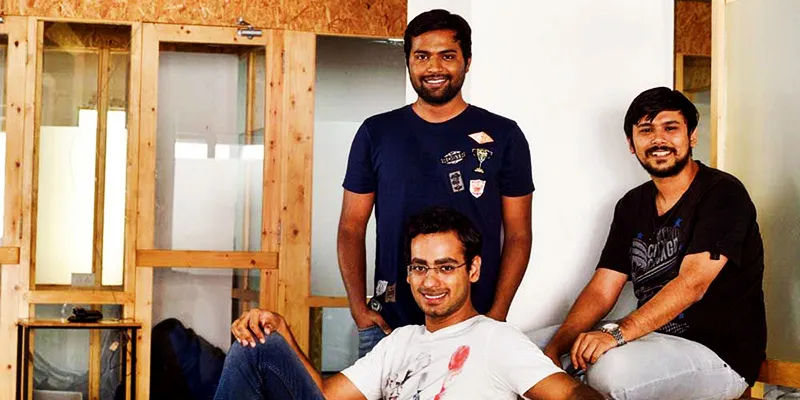
“We are good and fast with iterations,” says Farid Ahsan, long after we have talked about his startup ShareChat and where he wants to take it, adding, “that is what I think our investors like about us.”
With $5.25 million funding already in their kitty and eyes on a Series B soon, all I can do is smile and agree with him.
Twenty-five-year-old Farid, along with his co-founders and IIT Kanpur buddies Bhanu Singh (25), and Ankush Sachdeva (23), is on a quest to build India’s very own social network.
A social media mobile platform that is 100 percent desi, “where the majority of semi-urban and rural population do not get intimidated by the urban elite and PLU and can be themselves without being judged,” as he says.
ShareChat is a free Android-only app (they are consciously not on iOS) available in 10 regional languages (no English, thank you), and dialects (they call them ‘Meethi Boli’ on the app) like Bhojpuri, Chattisgarhi and others.
Since it came into being in 2015, they have acquired four million (and counting) active monthly users who share 200,000 daily posts that range from good morning messages to jokes to inspirational quotes to horoscopes to videos and news on the platform.
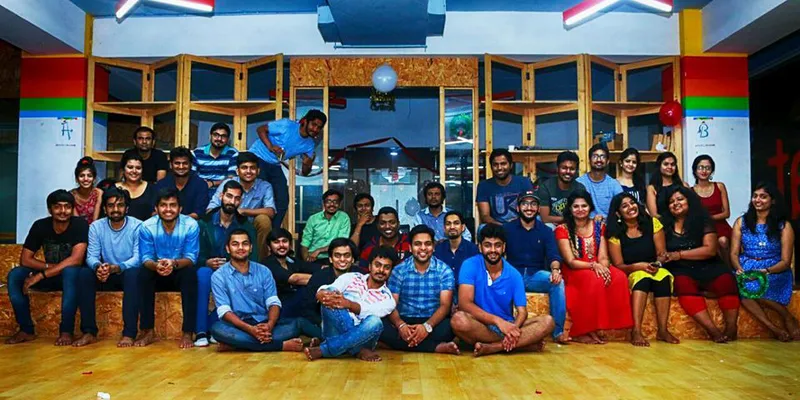
Can Facebook, which has its largest presence in India with 241 million active users compared to 240 million in the US, actually crush their dreams? We’ll come to that a bit later in the story.
For now, it is interesting to listen to Farid as he talks about the ‘first principles’ thinking and how they stay true to that and “jump to the highest level quickly” that helps them keep iterating and growing.
Acknowledging the fact that they are essentially hackers at heart, Farid says, “A hacker mindset has the ability to understand the ‘first principles’. They innovate using the ‘first principles’ of one domain with another.”
It is no wonder that his role model is Elon Musk, a proponent of the ‘first principles’ approach, who has reportedly been quoted as saying, “First principles is kind of a physics way of looking at the world. You boil things down to the most fundamental truths and say, ‘What are we sure is true?'…and then reason up from there...”
Break things and rebuild
The ShareChat office in Bengaluru, though located in a bustling neighbourhood, is off the Google map grid. There are no big signages announcing their existence. “We do not want to attract unnecessary attention,” says Farid, as he welcomes me to his spacious office that has more carpenters hammering on nails than employees on their keyboards. But then, the day has just begun.
“New office?” I ask. “Not really. We like to break things and rebuild,” answers Farid with a smile. Always iterating, I think to myself. Perhaps that has been their guiding philosophy since they started coding from their IIT dorms.

“We have been working together for the past five years,” says Farid, adding that the three co-founders - they were featured in Forbes latest 30 Under 30 list - started out as working/business partners first and their relationship slowly grew into a friendship.
In all, they have worked together on 17 projects, 14 of which failed. Their 15th project was an anonymous message board for WhatsApp groups (something like Secret) that had 250 users.
This was abandoned, and they iterated to a debating platform, Opinio, to mimic Reddit conversations. “There was a chatbot wave in 2014. We thought we would bring all the use cases of a chat room.”
To stir things up, they got people to ‘chat fight’ about who the number one Khan in Bollywood was. Alas, neither SRK nor Salman was able to ignite enough passion and they had to tank the project but not before they had 32,000 sign ups and a realisation that these were people who were ready to chat online but in their local language.
Another interesting development caught their attention that resulted in their ‘aha’ moment. Regulars on social media networks in search of growth hacks, the three came across a Facebook post calling for people to join a WhatsApp group to discuss all things Sachin Tendulkar and cricket.
“You will be surprised to know that there were 80,000 people who had responded with their phone numbers. They definitely did not know each other. We realised these people were not like us. They did not care about privacy and were happy to share their numbers for all to see,” says Farid.
A place to chill without fear
They had struck a goldmine.
Each founder created several WhatsApp groups to whet the appetite of this new segment of people who were being welcomed to the world of internet for the first time thanks mainly to Jio’s free data push and falling prices of low-end Android smartphones.
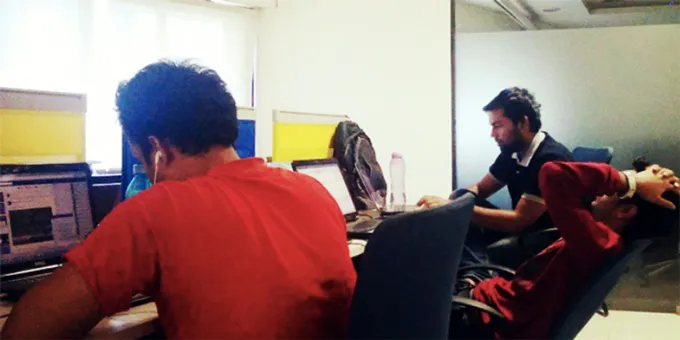
With 70 million plus users in India, WhatsApp has shown what a simple tech interface can achieve. The WhatsApp groups were their places to go to to find content. They were not like us who could search for what they wanted on Google. The groups were their Google.
“The real problem statement was the non-availability of content in local language,” explains Farid. Thus, in 2014, they stopped English as a language on their platform and adopted a news feed model killing all chatbots. They also launched a user-generated content (UGC) system.
Suddenly, a retired professor uncle deep in the forgotten bylanes of Midnapore was discovering a new world. A world where he could communicate with people and share his knowledge in his own language. And the best part was there were enough like-minded people who were responding to him. He was building his own following. He was a celebrity in his own right. He mattered.
“These users have a lot of aspirations, and, of course, English is one of them. But they are hesitant to enter, say an Instagram or a Twitter world where they feel they will be judged for the kind of content they want to consume and share. ShareChat is a place for them to chill without that fear,” says Farid.
Interestingly, he predicts that more people will move to ShareChat from Twitter, Instagram and other social sites instead of vice-versa. “It is easy to move an elephant than a herd of sheep,” he says, referring to the sheer size of the non-English speaking population in the country that will soon be using the internet.
Reaching the critical mass
In its April 2017 study titled, ‘Indian Languages - Defining India’s Internet’, KPMG India and Google state that “Indian language internet users are expected to account for nearly 75 percent of India’s internet user base by 2021.” The study notes that Hindi user base is likely to outgrow English user base by 2021 and along with Marathi and Bengali users will drive the volume growth.

Farid believes that for this population it is not the features of a platform but the experience on the platform that matters the most. “We are not a transaction-based startup, but a place where we want people to stick.”
Which is why they are focusing on user acquisition than finding ways to generate revenue. “The aim is to reach a critical mass,” says Farid. Anand Lunia of India Quotient, the first investor to put faith in the three founders, says, “Once you start to think about monetising, the DNA of the company changes. Generating revenue is expensive.” He feels the market and consumers are not mature enough yet.
Luckily for the founders, Dev Khare of LightSpeed India Partners that poured $4 million Series A in ShareChat in November last year, agreed with Anand that it was too soon to think of monetisation.
Farid says they hope to reach 25 million user base (an ambitious target) by the end of this fiscal year and have a plan in place for monetisation. From native ads to charging users to read exclusive content, to product placement with certain ‘influencer’ profiles, the founders say they have about 40 ideas already in place.
Content is king
“The bigger problem to solve is the content distribution first,” adds Farid. And that is easier said than done. Critics do not fail to point out that they are using semi-porn content to lure users, which Farid denies saying they only push out content that is anyways consumed in mass media like movies, television, and news media. “We cannot be accused of using pornography if we have a piece of content on Sunny Leone,” defends Farid. Nonetheless, he claims their algorithms pull down any vulgar content.
At the moment, 70 percent of their users are between 12 and 25 years and 70 percent are male from (86 percent) tier II and III cities. They have five percent international audience in Bangladesh (for the Bangla content), Canada, and Dubai.
Daily, three-and-a-half million content from ShareChat is shared on WhatsApp. Inside WhatsApp, their content has 20 times reshare on an average.
Farid says they are working on bringing more women to the platform hence cannot afford to have content that will push them away.
Aman Kumar, Chief Business Officer at KalaGato, an India-focused data analytics firm, says, “ShareChat, in our opinion, is one of those truly unique ideas because of its derivative model. For if WhatsApp did not exist would ShareChat exist?”
Interestingly, early-stage investment firm Venture Highway, which has a minority stake in ShareChat, is advised by Neeraj Arora, business head at WhatsApp.
According to Aman’s data, when compared with other entertainment content, ShareChat has been able to show a remarkable growth in terms of market share (see chart 1). However, when compared to other news media in local languages (see chart 2), it is slowly making its presence felt in the face of the likes of DailyHunt, which is clearly the leader now.
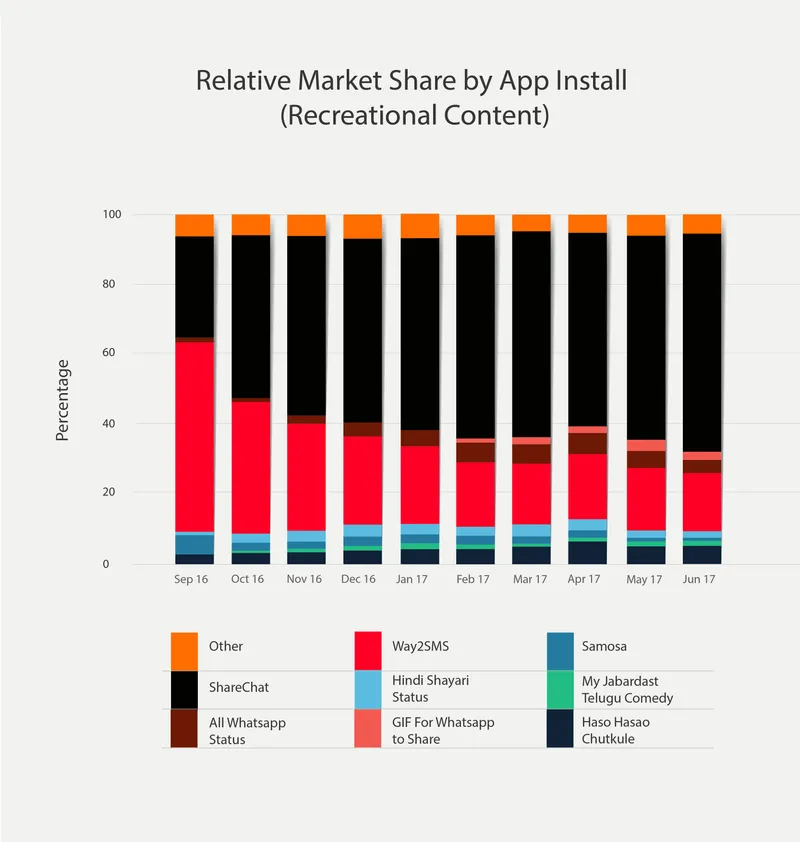
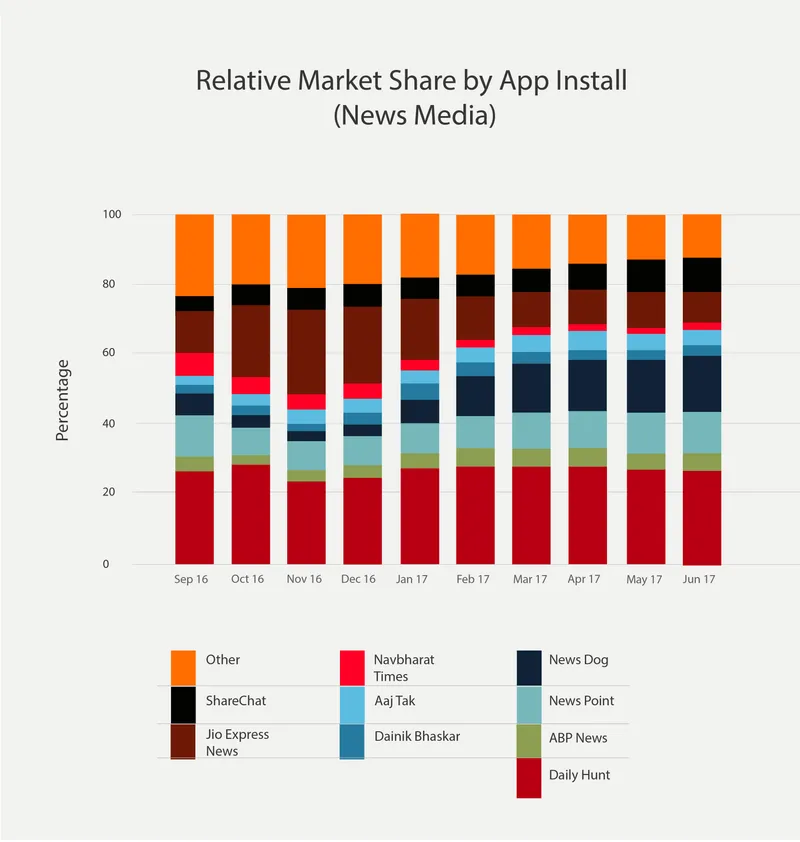
Though its investors believe that it is time there was a desi social network for and by Indians like the Chinese have their WeChat, some industry watchers believe it will not be so easy to ignore the Facebook juggernaut in India.
“Let’s face the reality that Facebook and YouTube are formidable competition,” says an entrepreneur in the consumer media app space. He believes the UGC model will only dilute the brand as it is difficult to control the content being generated. “China can have its Bingo Live and other such apps, but in India, which advertiser will be willing to associate with a brand that caters to the lowest common denominator,” he points out.
Towards a viable business
Answering for the three of them, Farid says that the most important lesson they have learned in their journey from coders to entrepreneurs is not to just follow their gut but to back it up with data. “I think why we failed 14 times is because of that,” he reflects.
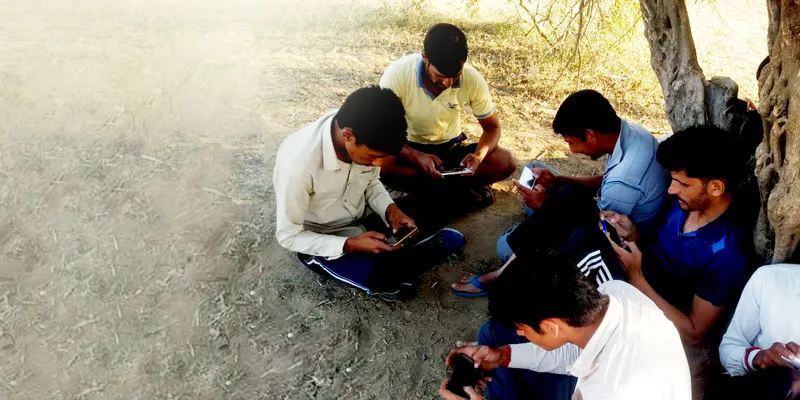
Another important lesson they were taught while building ShareChat, he points out, was empathy for this user base. Though they all come from smaller cities in India themselves when they started out it was not as if they were focused on this target group.
Also read: Here’s how your small-town cousins have bragging rights over you this festive season
Anand, who led the first board meeting in their kitchen, says that despite their young age, the founders have an admirable maturity in handling their finances. “Our major cost goes towards server maintenance. Our technology is on par with WhatsApp that can deliver for networks like 2G and patchy networks,” adds Farid, claiming that they have been able to contain their burn rate. “With our cost per installs (CPI) and cost per thousand impressions (CPM) models sorted, we can break even,” he states, adding that it is a viable business.
Despite Facebook’s strong gains, social media penetration in India, according to ‘The Next Web’ report, remains relatively low with just 19 percent of the country’s total population using Facebook in June. Thus when Farid says, “Jeet toh hum rahe hi hai, kitni badi jeet ho yeh dekhna hai,” you almost want to believe him.







